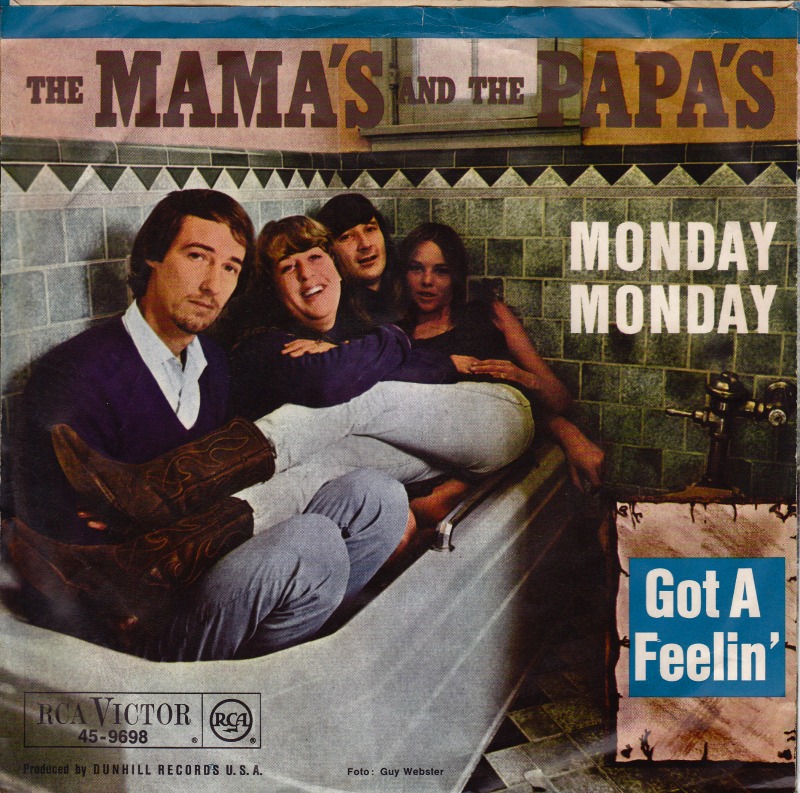May 7, 1966
- STAYED AT #1:3 Weeks
In The Number Ones, I'm reviewing every single #1 single in the history of the Billboard Hot 100, starting with the chart's beginning, in 1958, and working my way up into the present.
The bad person, good song dynamic strikes again. By the mid-'60s, John Phillips was a folk-music careerist in his thirties who knew that, to stay relevant, he needed to latch onto the surging folk-rock phenomenon, something that by most accounts he did out of pure music-biz cynicism rather than genuine interest. Phillips, a Naval Academy dropout, had some success with the folk group the Journeymen in the early '60s. Touring with that group, he'd met the teenage girl Michelle Gilliam, whereupon he left his wife, married Gilliam, and, eventually, founded the Mamas And The Papas.
The Mamas And The Papas were a sort of merger of two folk groups, the New Journeymen and the Mugwumps. Phillips had to be convinced to include Mama Cass Elliot in the group. He thought that she wasn't pretty enough and that she'd hinder their commercial chances; his bandmates and producer outvoted him. (Elliot went onto become the only Mama And The Papa to find any real solo success after the group's breakup.) Phillips took them all to the Virgin Islands and forced them to rehearse their harmonies militaristically. The Mamas And The Papas only got one #1 hit -- bafflingly, "California Dreamin'" peaked at #4 -- but they were huge for a while. They broke up in 1969, at least in part because they couldn't stop having affairs with each other.
In the '70s, Phillips did the score for the David Bowie movie The Man Who Fell To Earth and got himself hooked on heroin and cocaine. In the early '80s, he did a short prison stint for drug trafficking and co-wrote "Kokomo" for the Beach Boys. He died of heart failure in 2001. Years later, his daughter Mackenzie Phillips claimed that he'd drugged and raped her on the night before her wedding. She also says that they had an 11-year incestuous affair and that she once had to get an abortion because she didn't know whether the father was her husband or her own father. The Phillips family is split on whether or not they believe Mackenzie. (Mackenzie's half-sister Chynna Phillips, who became one third of Wilson Phillips and who will eventually show up in this column, is on Mackenzie's side.)
John Phillips has never been proven to be an incestuous rapist. But if anyone in your family is willing to believe that of you, then you did not live a good life. In this column, we have heaped praises on the work of Phil Spector, a pathological abuser and actual convicted murderer. And so now we must note here that John Phillips wrote "Monday, Monday" and that "Monday, Monday" is a bop.
Phillips wrote "Monday, Monday" in 20 minutes and later said that he had no idea what it meant. It doesn't really mean anything. It's a song about heartbreak and also a song about Monday typically being a bad day. It's a Garfield punchline. And yet it's a Garfield punchline rendered in floridly gorgeous state-of-the-art symphonic California folk rock, blanketed with these woozily rich overlapping harmonies. They sounded and looked a bit like a cult, these starry-eyed young people with the incredible voices who would stare off into the middle distance and lightly sway while singing this song about Mondays. And they sang so prettily that you would have to consider, at least for a moment, joining that cult.
The group recorded the song with the Wrecking Crew, of course. And it's piled high with strings and harpsichords and tremolo guitars. There's a great false ending -- after "Good Lovin'," "Monday, Monday" is the second consecutive #1 hit with a false ending -- and the silence lasts just long enough for those harmonies to bring a whole new endorphin rush when it kicks in again. It's almost too rich of a song. And by the early '70s, that chirpy and symphonic studio-pop will lead to a great many mindbogglingly boring hits. ("Monday, Monday" was the first #1 hit from producer Lou Adler, currently best-known as the weird old guy who sits next to Jack Nicholson at Lakers games; we will hear from him a whole lot more.) But on its own, divorced from all its context, "Monday, Monday" remains a thrilling little burst of beauty.
GRADE: 8/10
BONUS BEATS: Here's "Monday, Monday" soundtracking a car chase from the 2010 movie The Other Guys:






